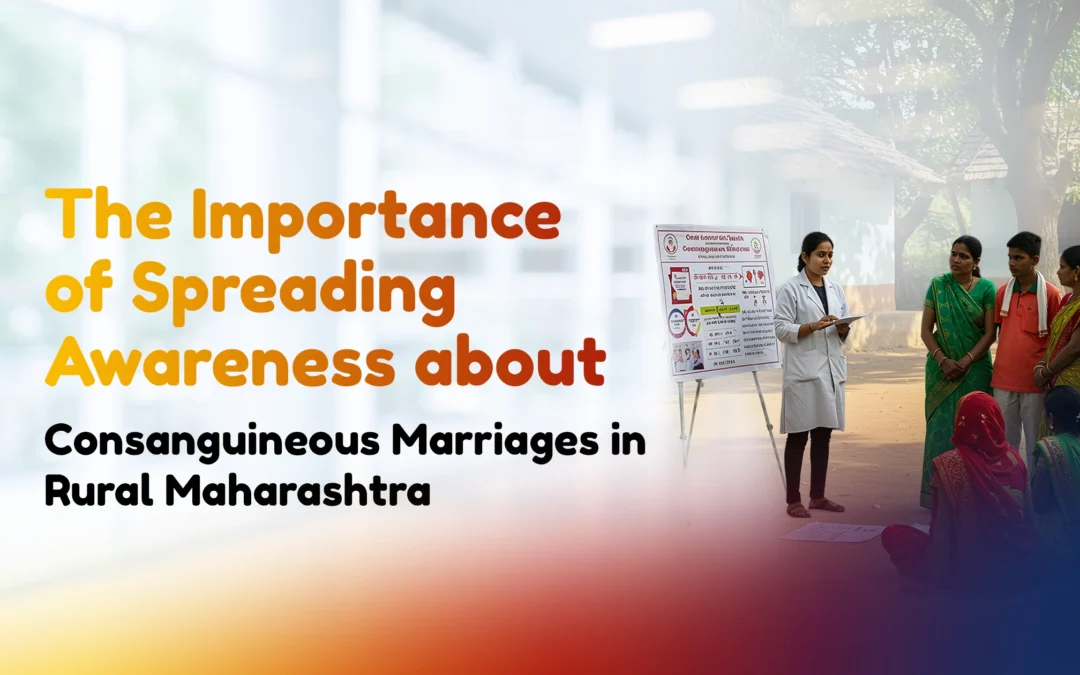In many parts of rural India — including regions of Maharashtra — consanguineous marriages (marriages between close relatives such as first or second cousins) have been a part of cultural and social tradition for generations.
While these practices may be rooted in community bonding or family customs, modern medical science has shown that such marriages can significantly increase the risk of genetic and hereditary disorders in children.
At Happy Kids Foundation, we believe that awareness is the first step towards prevention.
By educating families about the risks and scientific facts, we can help build healthier generations and reduce preventable childhood illnesses.
1. What Is a Consanguineous Marriage?
A consanguineous marriage is a union between individuals who are biologically related — often first or second cousins.
In such cases, both partners may carry the same recessive gene for certain inherited diseases.
When both parents pass on this defective gene, the child has a higher chance of developing serious genetic disorders.
2. The Genetic Connection – What Science Says
Every person carries two copies of each gene — one from each parent.
Some genes can carry “silent” defects, known as recessive mutations. These defects usually cause no problem unless both copies are faulty.

In marriages between close relatives:
- There’s a higher chance that both parents share the same defective gene.
- This increases the risk of genetic diseases like:
- Thalassemia (blood disorder)
- Primary Immunodeficiency Disorders (PIDs)
- Congenital malformations
- Developmental delay or intellectual disability
- Metabolic disorders
In some regions, nearly 20–30% of children born from consanguineous unions may have a higher likelihood of genetic illness.
3. Impact on Child Health and Family Well-being
The consequences of such genetic conditions go far beyond medical complications.
- Families often face emotional distress and financial burden due to long-term treatments.
- Many of these disorders require lifelong medical care, blood transfusions, or expensive therapies.
- In rural areas, where healthcare access is already limited, this adds immense strain to the family’s wellbeing.
Creating awareness helps families make informed decisions before marriage and during pregnancy.
4. The Role of Genetic Counseling and Testing
Modern medicine offers simple, accessible solutions to prevent genetic diseases, even in communities where consanguinity exists.
✅ Genetic Counseling:
- Helps families understand the risks and inheritance patterns of diseases.
- Offers advice before marriage or conception.
✅ Carrier Screening Tests:
- Simple blood tests can identify if both partners carry the same genetic trait (like Thalassemia or Sickle Cell Anemia).
- If both are carriers, preventive measures like prenatal diagnosis or IVF with genetic screening can help ensure a healthy child.
At Happy Kids Foundation, we regularly conduct awareness drives, diagnostic camps, and counseling programs in rural Maharashtra to educate families about these preventive tools.
5. Breaking the Myths – A Social Perspective
Many families continue the practice of consanguineous marriage believing it “keeps wealth or property within the family.”
However, what’s often overlooked is the hidden cost of hereditary disease — emotional, financial, and generational.
Raising awareness doesn’t mean disrespecting cultural traditions; it means strengthening communities with knowledge.
Educated decisions today can prevent lifelong suffering tomorrow.
6. How Awareness Can Create Change
Through consistent community education, we can:
- Reduce the prevalence of preventable genetic disorders.
- Encourage premarital and prenatal screening.
- Build acceptance for scientific healthcare practices in rural communities.
- Empower families with knowledge, not fear.
By combining medical science with cultural sensitivity, we can make rural Maharashtra a model for informed healthcare choices.
Conclusion

Consanguineous marriages are not merely a social custom — they’re a public health issue that needs dialogue, awareness, and compassion.
At Happy Kids Foundation, we stand committed to spreading scientific awareness in rural communities to ensure that every child is born healthy and every family is empowered with information.
Let’s move from tradition to transformation — because awareness today means healthier generations tomorrow.

